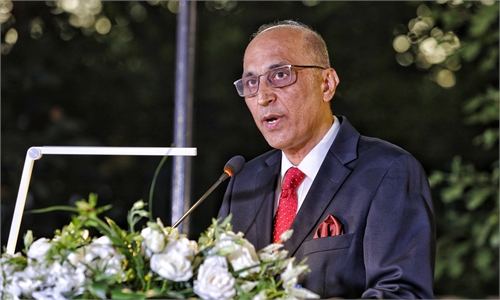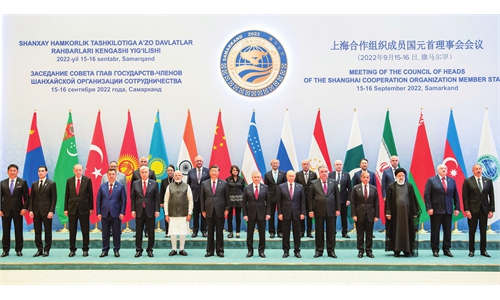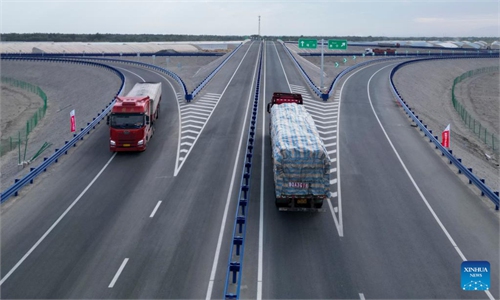IN-DEPTH / DIPLOMATIC CHANNEL
SCO becoming more attractive to other countries for non-bloc status principle, mutual benefit: former Uzbek deputy PM
Joint prosperity path
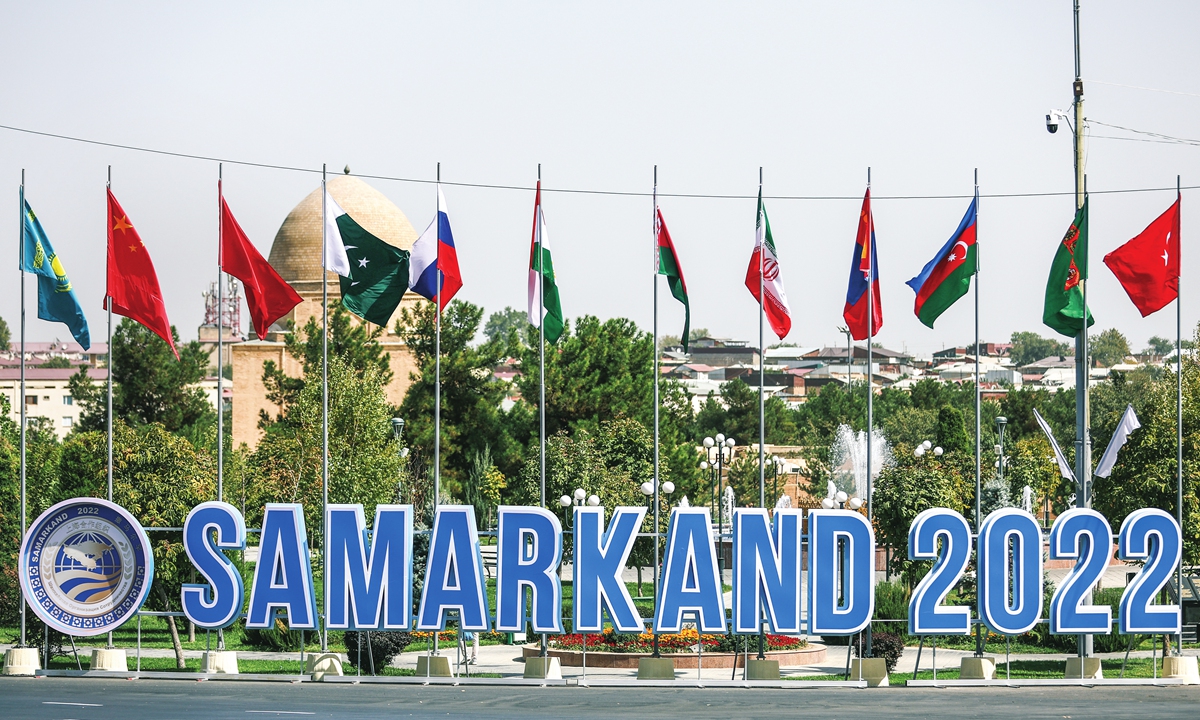
A signboard of the SCO Samarkand Summit and national flags of member states are seen in Samarkand, Uzbekistan. Photo: VCG
Editor's Note:The just concluded 22nd meeting of the Council of Heads of State of the Shanghai Cooperation Organisation (SCO) in Samarkand, Uzbekistan attracted a great deal of attention with top leaders weighing in on important international agendas. How can China and Uzbekistan become an active force in actively developing bilateral cooperation and jointly exploring the implementation of regional development initiatives? What's the most important outcome from the summit? What important role does China play in the SCO and in the region? What development momentum has China brought to the region and the world? The Global Times reporters Xie Wenting and Lin Xiaoyi (GT) interviewed Saidmukhtar Saidkasimov (Saidkasimov), former Uzbek deputy prime minister and former minister of Foreign Affairs of Uzbekistan on these topics.
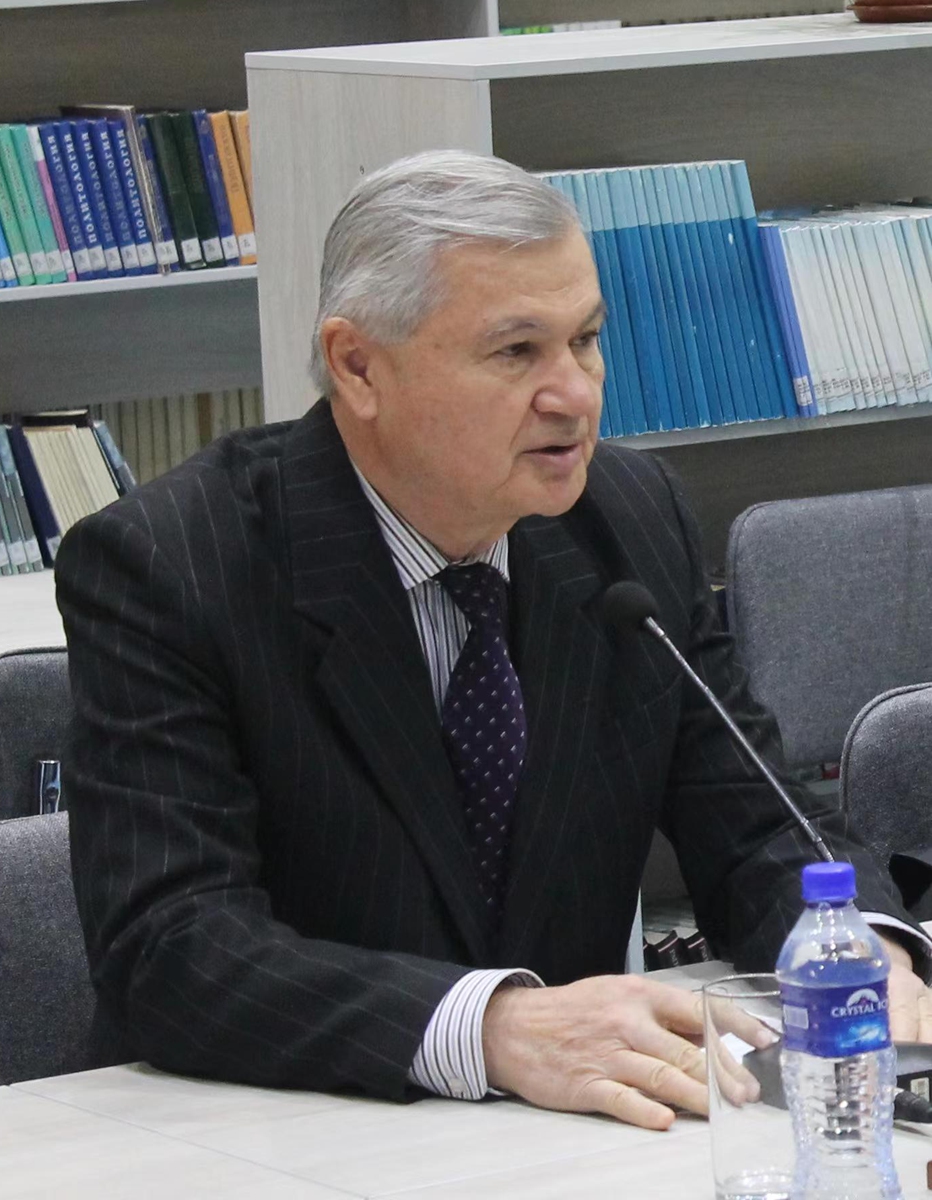
Saidmukhtar Saidkasimov Photo: Courtesy of Saidkasimov
GT: China-Uzbekistan relations were upgraded to a comprehensive strategic partnership in 2016. How do you assess the current level of the relationship between the two countries?Saidkasimov: The level and nature of relations between Uzbekistan and China is most clearly evidenced by the just concluded and very successful state visit of Chinese President Xi Jinping to Uzbekistan, which became a historic event for our peoples.
It is symbolic that on the eve of this visit, the distinguished Chinese leader addressed the residents of our republic in a specially signed article with the significant title "Working Together for a Brighter Future of China-Uzbekistan Relations," in which he highly appreciated the mutually beneficial relations between our countries, which have a constant growth dynamic. This appeal of the Chinese leader received a great many positive responses and support throughout our country.
China and Uzbekistan are united through vital interests and a common future. Our countries are in close cooperation both on a bilateral basis and within the framework of the SCO and other multilateral platforms, jointly opposing external interference, fighting the transnational organized crimes of the "three evil forces" of terrorism, extremism and separatism, increasing the exchange of information and expanding the scale of training personnel for the sake of a common security.
Since the outbreak of the COVID-19 pandemic, the two countries have intensified anti-epidemic cooperation in the spirit of solidarity and mutual assistance.
This year marks the 30th anniversary of China-Uzbekistan diplomatic ties.The two millennia-long history of friendly exchanges and the 30-year practice of mutually beneficial cooperation shows that the strengthening of all-round cooperation is in line with the trends of the times and the fundamental interests of the two countries and peoples.
GT: Uzbekistan is an important contributor to the China-proposed Belt and Road Initiative (BRI). How do you assess the cooperation between the two countries under the framework of the BRI? What are the benefits the BRI has brought to Uzbekistan?
Saidkasimov: It should be noted that there are very fruitful areas of cooperation between our two countries almost a decade after the BRI was launched. China has firmly held the position of the main economic partner of Uzbekistan for many years. Under the framework of the BRI, a number of interstate, intergovernmental, and interdepartmental agreements have created the necessary legal framework for growing investment cooperation. Projects are being successfully implemented through industrial cooperation, modernization of infrastructure, pharmaceuticals, telecommunications, and the creation of joint high-tech industrial parks with the participation of companies from both countries.
With the help of China, Uzbekistan is significantly diversifying export directions, modernizing infrastructure, reorienting investment flows to new directions, and increasing their potential.
At the same time, along the Silk Road, cultural and humanitarian cooperation is also actively developing. More and more joint events are being held, including art festivals, gala concerts, exhibitions and seminars. Cooperation is expanding in such areas as student exchange, translation and publication of literary works, cinematography, translation and the display of television programs, and interregional contacts and training, which effectively contributes to the rapprochement of our peoples.
A huge number of examples convincingly show the creative power of the broad, multifaceted and constantly growing cooperation between Uzbekistan and China confirms the reality and validity of the great long-term expectations of our peoples to further strengthen friendly ties with your great country.
GT: From your point of view, what are the main achievements of the 22nd meeting of the Council of Heads of State of the Shanghai Cooperation Organization (SCO)?
Saidkasimov: In general, there is every reason to believe that the summit was successful and, most importantly, productive. Despite the difficulties caused by the COVID-19 global pandemic, the outlined plans for the chairmanship of Uzbekistan in the SCO were implemented in full and more than 80 major international events were held with the active participation of representatives from the SCO.
The main document of the meeting was the very detailed "Samarkand Declaration of the Council of the Heads of State of Shanghai Cooperation Organization." A record number of agreements, concepts, programs, and other decisions have also been adopted.
Along with security issues, priority was given to the expansion of trade, and economic and humanitarian cooperation.
Noteworthy are the statements of the Council of the Heads of State of the SCO on actions to respond to climate change and on ensuring global food and energy security. Programs on cooperation between the SCO countries in the fields of the use of renewable energy sources, as well as in the development of artificial intelligence, were signed.
It is no coincidence that the Samarkand Declaration specifically noted the enormous preparatory work done under the leadership of President Shavkat Mirziyoyev for the meeting in Samarkand.
GT: Why is the SCO so appealing to many countries when the world is becoming more and more divided?
Saidkasimov: It is known that international cooperation meets the interests of everyone and every country needs multilateral institutions. Despite certain shortcomings, multilateral institutions serve as the most important conductors of interstate interaction at the regional and global levels, helping countries overcome differences and strengthen mutual understanding, developing political and economic cooperation, expanding trade, and stimulating cultural and humanitarian exchanges.
These are the goals and objectives pursued by the SCO, which, in fact, is a unique interstate structure that has managed to unite countries with different cultural characteristics, foreign policy guidelines and models of national development.
In a short period of time, the SCO has come a long way to becoming an integral element of the modern global political and economic world order.
The key to the international attractiveness of the SCO is its non-bloc status, openness, non-alignment against third countries or international organizations, equality and respect for the sovereignty of all participants and a refusal to interfere in internal affairs among others.
Every year, the number of countries that are ready to join the activities of the SCO is growing, and this is especially noticeable in the context of the transformation of the modern system of international and regional relations. The economic value of the SCO is enhanced by the self-sufficiency of its space, where there are dynamically developing economies of the world with huge human, intellectual, and technological potential, and the presence of largely unused natural resources.
In a world with new challenges and opportunities, the SCO has excellent prospects for transformation and growth, not only through quantitative replenishment, but also through the opening of new strategic sectors for cooperation.
The expansion of the geographical coverage of the SCO is a confirmation of the relevance of this Organization, demonstrating its effectiveness and dynamism. As emphasized in the Samarkand Declaration, the expansion of the SCO and the further deepening of cooperation with observer states, its dialogue partners, and other international associations, will expand the potential of the SCO, further enhancing its role in the international arena as a multilateral mechanism for solving the urgent problems of our time, ensuring security and stability, and sustainable development in a vast region.
GT: What, from your point of view, are the differences between the increase in SCO membership and the expansion of NATO?
Saidkasimov: First of all, it should be noted that the SCO and NATO are completely incomparable organizations. NATO is an openly military-political bloc (alliance) of states for the purpose of joint defense or offense. According to the latest data, the total military spending of all NATO countries is almost 60 percent of global defense spending, while each member is required to maintain targeted spending in this area of at least 2 percent of their GDP.
As for the SCO, from the very beginning of its creation it did not have a military component, military structures, and defense duties. The SCO strictly maintains its non-bloc status and openness. As it is again specifically emphasized in the Samarkand Declaration, the member states, in accordance with the principles of the SCO Charter, adhere to a line that excludes bloc, ideological, and confrontational approaches to solving problems of international and regional development, countering traditional and non-traditional challenges and security threats. It upholds the principle of constructing a new type of international relations in the spirit of mutual respect, justice, equality, and mutual benefit.

Uzbek staff members monitor PVC production at a Chinese-built nitrogen fertilizer company in Navoi, Uzbekistan, on August 18, 2022. Photo: Xinhua
GT: Some Western commentators have suggested that the SCO is becoming a possible counterbalance to NATO and Western dominance in general. What's your take on it?Saidkasimov: Indeed, in certain political centers of the West, a panicked idea is being formed that the SCO is becoming an alliance against the entire Western world and Western values. A number of my Western colleagues - politicians and experts - have expressed such opinions in our communications. But this is an absolutely wrong interpretation of the very essence of the functioning of the SCO, because the SCO sets primarily socio-economic and humanitarian goals, as we have already mentioned above.
The SCO demonstrates its firm commitment to the principles of openness and non-alignment, and has successfully expanded mutually beneficial cooperation both between the member states of the SCO and with all interested countries.
GT: How do you assess China's role in the SCO and its contribution to the organization?
Saidkasimov: The role of China as one of the founders of the SCO is enormous in its formation and further development. China's role continues to be the leading factor in the broadening and deepening of SCO cooperation, especially economic and trade relations among all member states.
This is most clearly evidenced by the latest specific indicators. Despite the growing problems and difficulties, and a significant downturn in the global economy, China's trade with other SCO states has shown rapid growth: The trade volume jumped 26 percent year-on-year to 1.73 trillion yuan ($ 250 billion) in the January-August period. The growth rate was 15.9 percentage points higher than that of China's total foreign trade.
At the same time, the export of Chinese engineering and electronics products, labor-intensive goods, and basic organic chemicals to other SCO countries also remains very significant. Countless facts testify to the significant role of China in the further development of this international organization.
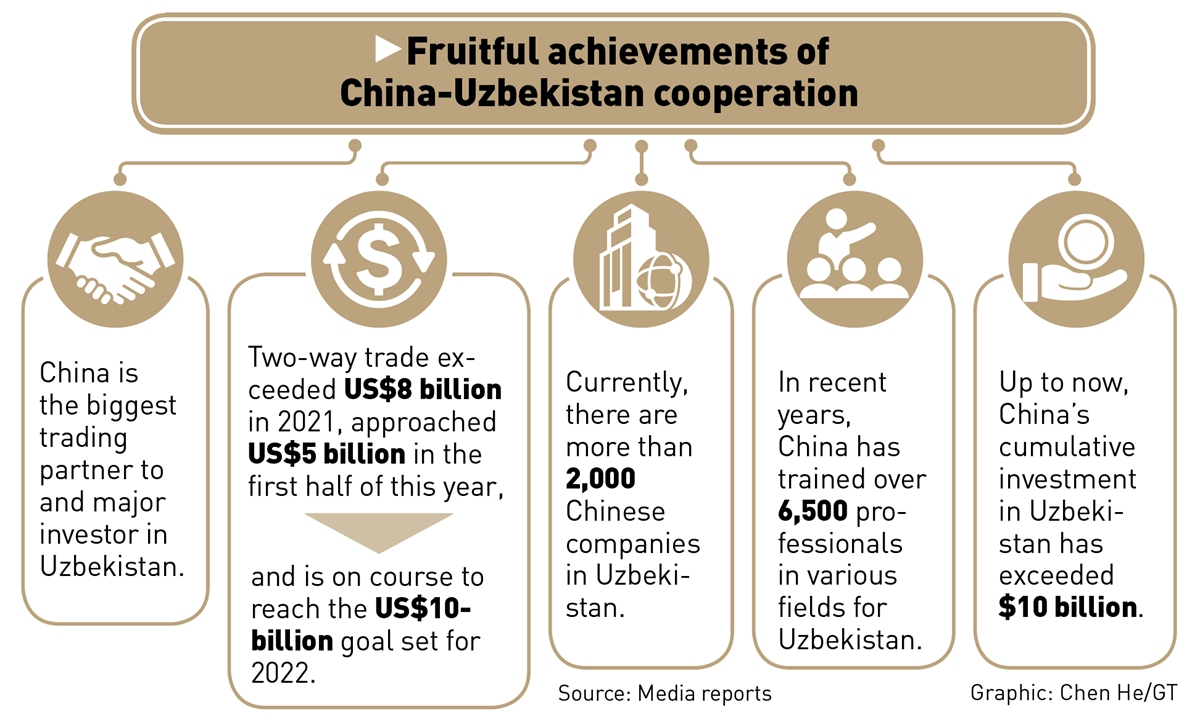
Graphic:GT
